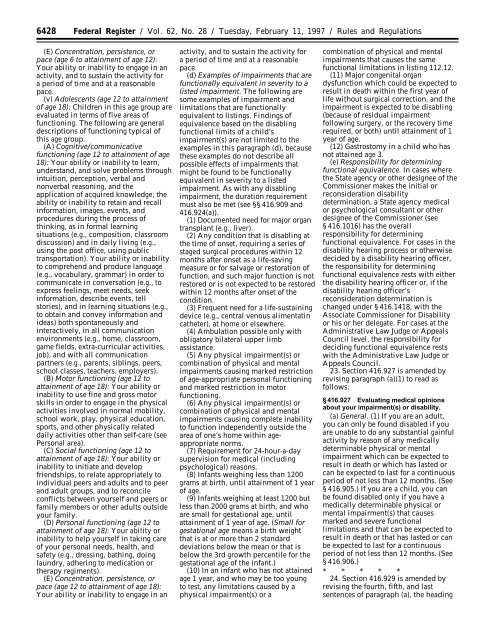federal register - U.S. Government Printing Office
federal register - U.S. Government Printing Office
federal register - U.S. Government Printing Office
You also want an ePaper? Increase the reach of your titles
YUMPU automatically turns print PDFs into web optimized ePapers that Google loves.
6428 Federal Register / Vol. 62, No. 28 / Tuesday, February 11, 1997 / Rules and Regulations(E) Concentration, persistence, orpace (age 6 to attainment of age 12):Your ability or inability to engage in anactivity, and to sustain the activity fora period of time and at a reasonablepace.(v) Adolescents (age 12 to attainmentof age 18): Children in this age group areevaluated in terms of five areas offunctioning. The following are generaldescriptions of functioning typical ofthis age group.(A) Cognitive/communicativefunctioning (age 12 to attainment of age18): Your ability or inability to learn,understand, and solve problems throughintuition, perception, verbal andnonverbal reasoning, and theapplication of acquired knowledge; theability or inability to retain and recallinformation, images, events, andprocedures during the process ofthinking, as in formal learningsituations (e.g., composition, classroomdiscussion) and in daily living (e.g.,using the post office, using publictransportation). Your ability or inabilityto comprehend and produce language(e.g., vocabulary, grammar) in order tocommunicate in conversation (e.g., toexpress feelings, meet needs, seekinformation, describe events, tellstories), and in learning situations (e.g.,to obtain and convey information andideas) both spontaneously andinteractively, in all communicationenvironments (e.g., home, classroom,game fields, extra-curricular activities,job), and with all communicationpartners (e.g., parents, siblings, peers,school classes, teachers, employers).(B) Motor functioning (age 12 toattainment of age 18): Your ability orinability to use fine and gross motorskills in order to engage in the physicalactivities involved in normal mobility,school work, play, physical education,sports, and other physically relateddaily activities other than self-care (seePersonal area).(C) Social functioning (age 12 toattainment of age 18): Your ability orinability to initiate and developfriendships, to relate appropriately toindividual peers and adults and to peerand adult groups, and to reconcileconflicts between yourself and peers orfamily members or other adults outsideyour family.(D) Personal functioning (age 12 toattainment of age 18): Your ability orinability to help yourself in taking careof your personal needs, health, andsafety (e.g., dressing, bathing, doinglaundry, adhering to medication ortherapy regiments).(E) Concentration, persistence, orpace (age 12 to attainment of age 18):Your ability or inability to engage in anactivity, and to sustain the activity fora period of time and at a reasonablepace.(d) Examples of impairments that arefunctionally equivalent in severity to alisted impairment. The following aresome examples of impairment andlimitations that are functionallyequivalent to listings. Findings ofequivalence based on the disablingfunctional limits of a child’simpairment(s) are not limited to theexamples in this paragraph (d), becausethese examples do not describe allpossible effects of impairments thatmight be found to be functionallyequivalent in severity to a listedimpairment. As with any disablingimpairment, the duration requirementmust also be met (see §§ 416.909 and416.924(a)).(1) Documented need for major organtransplant (e.g., liver).(2) Any condition that is disabling atthe time of onset, requiring a series ofstaged surgical procedures within 12months after onset as a life-savingmeasure or for salvage or restoration offunction, and such major function is notrestored or is not expected to be restoredwithin 12 months after onset of thecondition.(3) Frequent need for a life-sustainingdevice (e.g., central venous alimentatincatheter), at home or elsewhere.(4) Ambulation possible only withobligatory bilateral upper limbassistance.(5) Any physical impairment(s) orcombination of physical and mentalimpairments causing marked restrictionof age-appropriate personal functioningand marked restriction in motorfunctioning.(6) Any physical impairment(s) orcombination of physical and mentalimpairments causing complete inabilityto function independently outside thearea of one’s home within ageappropriatenorms.(7) Requirement for 24-hour-a-daysupervision for medical (includingpsychological) reasons.(8) Infants weighing less than 1200grams at birth, until attainment of 1 yearof age.(9) Infants weighing at least 1200 butless than 2000 grams at birth, and whoare small for gestational age, untilattainment of 1 year of age. (Small forgestational age means a birth weightthat is at or more than 2 standarddeviations below the mean or that isbelow the 3rd growth percentile for thegestational age of the infant.)(10) In an infant who has not attainedage 1 year, and who may be too youngto test, any limitations caused by aphysical impairment(s) or acombination of physical and mentalimpairments that causes the samefunctional limitations in listing 112.12.(11) Major congenital organdysfunction which could be expected toresult in death within the first year oflife without surgical correction, and theimpairment is expected to be disabling(because of residual impairmentfollowing surgery, or the recovery timerequired, or both) until attainment of 1year of age.(12) Gastrostomy in a child who hasnot attained age 3.(e) Responsibility for determiningfunctional equivalence. In cases wherethe State agency or other designee of theCommissioner makes the initial orreconsideration disabilitydetermination, a State agency medicalor psychological consultant or otherdesignee of the Commissioner (see§ 416.1016) has the overallresponsibility for determiningfunctional equivalence. For cases in thedisability hearing process or otherwisedecided by a disability hearing officer,the responsibility for determiningfunctional equivalence rests with eitherthe disability hearing officer or, if thedisability hearing officer’sreconsideration determination ischanged under § 416.1418, with theAssociate Commissioner for Disabilityor his or her delegate. For cases at theAdministrative Law Judge or AppealsCouncil level, the responsibility fordeciding functional equivalence restswith the Administrative Law Judge orAppeals Council.23. Section 416.927 is amended byrevising paragraph (a)(1) to read asfollows:§ 416.927 Evaluating medical opinionsabout your impairment(s) or disability.(a) General. (1) If you are an adult,you can only be found disabled if youare unable to do any substantial gainfulactivity by reason of any medicallydeterminable physical or mentalimpairment which can be expected toresult in death or which has lasted orcan be expected to last for a continuousperiod of not less than 12 months. (See§ 416.905.) If you are a child, you canbe found disabled only if you have amedically determinable physical ormental impairment(s) that causesmarked and severe functionallimitations and that can be expected toresult in death or that has lasted or canbe expected to last for a continuousperiod of not less than 12 months. (See§ 416.906.)* * * * *24. Section 416.929 is amended byrevising the fourth, fifth, and lastsentences of paragraph (a), the heading


